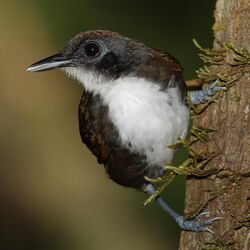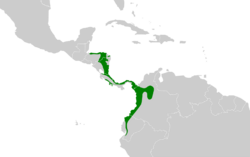Biology:Bicolored antbird
| Bicolored antbird | |
|---|---|

| |
| Scientific classification | |
| Domain: | Eukaryota |
| Kingdom: | Animalia |
| Phylum: | Chordata |
| Class: | Aves |
| Order: | Passeriformes |
| Family: | Thamnophilidae |
| Genus: | Gymnopithys |
| Species: | G. bicolor
|
| Binomial name | |
| Gymnopithys bicolor (Lawrence, 1863)
| |

| |
| Synonyms | |
|
Gymnopithys leucaspis bicolor | |
The bicolored antbird (Gymnopithys bicolor) is a species of bird in the family Thamnophilidae. It is found in Honduras south to Panama, western Colombia and Ecuador. Its natural habitat is subtropical or tropical moist lowland forest.
It is dark brown with a white belly and grey and black facial markings.
Taxonomy
The bicolored antbird was described by the American amateur ornithologist George Newbold Lawrence in 1863 and given the binomial name Pithys bicolor.[2]
There are five recognised subspecies:[3]
- G. b. olivascens (Ridgway, 1891) – Honduras to west Panama
- G. b. bicolor (Lawrence, 1863) – east Panama and northwest Colombia
- G. b. daguae Hellmayr, 1906 – west Colombia
- G. b. aequatorialis (Hellmayr, 1902) – southwest Colombia and west Ecuador
- G. b. ruficeps Salvin & Godman, 1892 – central Colombia
The bicolored antbird was formerly considered as conspecific with the white-cheeked antbird. They were split into separate species based on the results of a genetic study published in 2007 that found that the white-cheeked antbird was more similar to the rufous-throated antbird than it was to the bicolored antbird.[4][5]
Gallery
References
- ↑ BirdLife International (2016). "Gymnopithys bicolor". IUCN Red List of Threatened Species 2016: e.T22730409A104035236. doi:10.2305/IUCN.UK.2016-3.RLTS.T22730409A104035236.en. https://www.iucnredlist.org/species/22730409/104035236. Retrieved 16 November 2021.
- ↑ Lawrence, George Newbold (1867). "Catalogue of a collection of birds, made in new Granada, by James McLeannan, Esq., of New York, with notes and descriptions of new species". Annals of the Lyceum of Natural History of New York 8: 6–7. https://biodiversitylibrary.org/page/16022235.
- ↑ Gill, Frank; Donsker, David, eds (2018). "Antbirds". World Bird List Version 8.1. International Ornithologists' Union. http://www.worldbirdnames.org/bow/antbirds/. Retrieved 16 March 2018.
- ↑ Brumfield, R.T.; Tello, J.G.; Cheviron, Z.A.; Carling, M.D.; Crochet, N.; Rosenberg, K.V. (2007). "Phylogenetic conservatism and antiquity of a tropical specialization: Army-ant-following in the typical antbirds (Thamnophilidae)". Molecular Phylogenetics and Evolution 45 (1): 1–13. doi:10.1016/j.ympev.2007.07.019. PMID 17768072. https://digitalcommons.lsu.edu/cgi/viewcontent.cgi?article=1583&context=biosci_pubs.
- ↑ Freeman, Ben (September 2013). "Proposal (587): Split Gymnopithys leucaspis into two species". South American Classification Committee of the American Ornithological Society. http://www.museum.lsu.edu/~Remsen/SACCprop587.htm. Retrieved 16 March 2018.
`
Further reading
- Skutch, Alexander F. (1969). "Bicolored antbird". Life Histories of Central American Birds III: Families Cotingidae, Pipridae, Formicariidae, Furnariidae, Dendrocolaptidae, and Picidae. Pacific Coast Avifauna, Number 35. Berkeley, California: Cooper Ornithological Society. pp. 248–269. https://sora.unm.edu/sites/default/files/journals/pca/pca_035.pdf#page=248. Skutch describes the race Gymnopithys leucaspis olivascen which after the split is now Gymnopithys bicolor olivascens.
External links
Wikidata ☰ Q11843765 entry
 |




